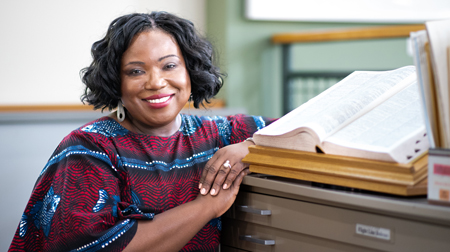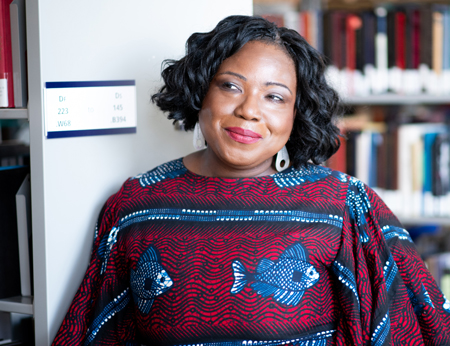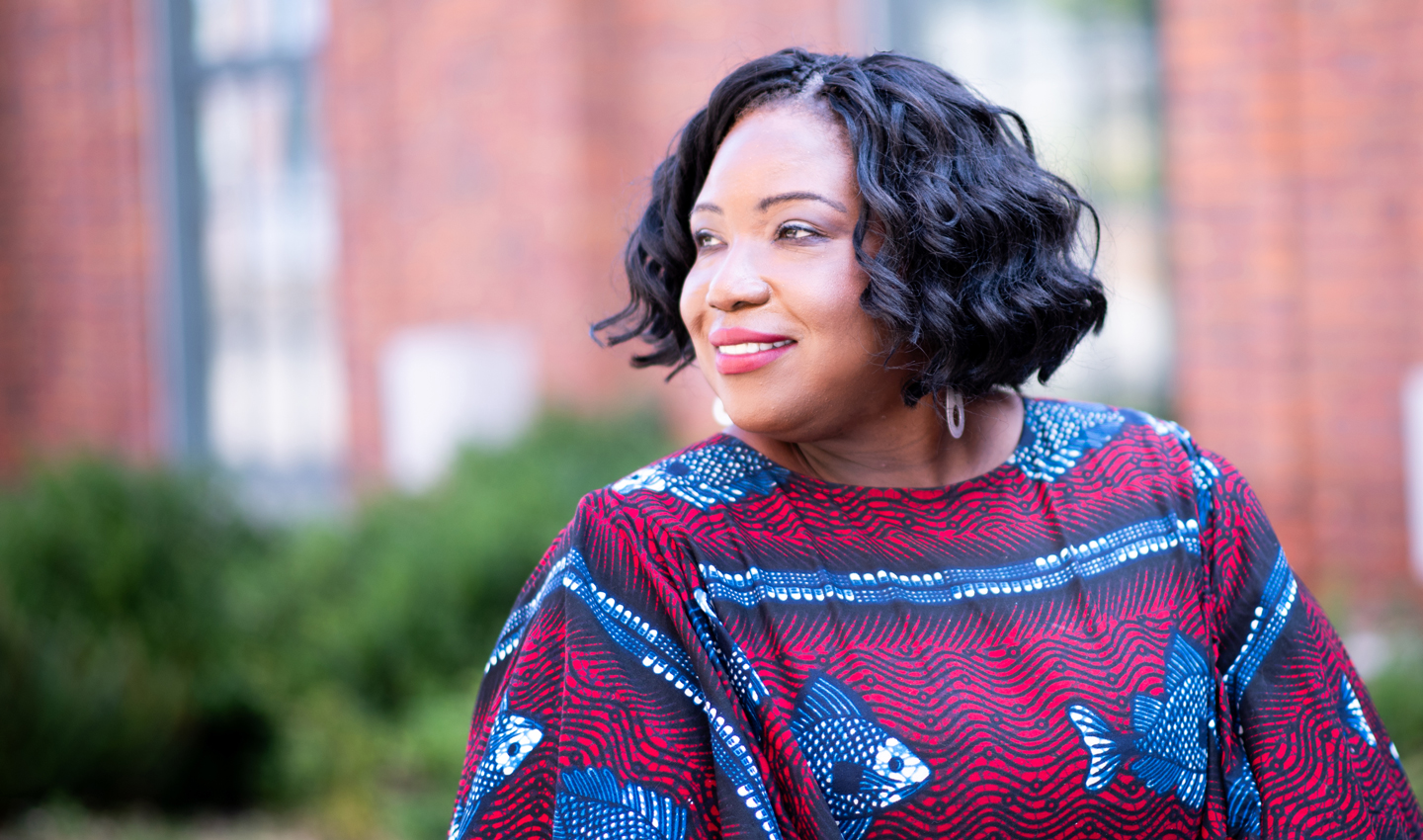The star power at the Time100 Gala in New York City last October rivaled the bright lights of nearby Broadway. Luminaries from director Steven Spielberg to actor Angela Bassett to rapper Doja Cat took center stage at the magazine’s glittering annual celebration of the 100 most influential people in the world.
The spotlight shifted from glamour to grit when honoree Tracie D. Hall, ’00, took the microphone. The widely acclaimed “warrior librarian” had earned national attention for her tenacious fight against censorship during her tenure as executive director of the American Library Association. In her toast, she honored her fellow librarians, her fellow warriors, who “despite bomb threats and threats of jail time are fighting to ensure that these words that stand as a vision of the American Library Association will always ring true: Free people read freely. Free people read freely. Free people read freely.” As she closed her toast with a fourth exhortation of those four powerful words, the A-List audience responded with a standing ovation.
Those four words remain Hall’s rallying cry as she continues her crusade defending libraries as the bulwark of democracy, vital for enhancing learning for all and instrumental for unleashing the intellectual and social potential of patrons, especially young ones. Her passion for working with young adults and for advancing her field has brought her back to the UW’s iSchool as a Distinguished Practitioner in Residence. In her courses and research, she is providing the next generation of librarians with the real-world context necessary to better serve an increasingly diverse public in the face of ever escalating challenges. “I hope I can be a source of the same kind of inspiration and learning that I experienced at the iSchool,” says Hall.
The power of libraries
Hall discovered the magic and power of libraries at the side of her grandmother, Bessie Marie Sanders-Scott, who had a limited education while growing up in the rural South and was awed by all that libraries offered. The pair frequently walked together to their local Watts branch of the Los Angeles Public Library, where Hall occasionally crashed story time for younger children by acting out the plot lines and found herself transported to far off places in the books she read. “The library was a place where my grandmother encouraged me to roam free, to leap in and discover,” Hall recalls.
It was in one such far-off place that Hall first experienced the harsh impacts of censorship: at the University of Nairobi in Kenya, where she studied abroad as an exchange student at the University of California Santa Barbara. Due to tight government controls, Hall and her classmates in her African literature class had to search for their assigned books at Nairobi’s contraband market. Whoever found a book passed it around so everyone could write out chapters, like scribes.
“That’s where I really understood how dangerous censorship was, how it stifles potential, intellectual development and the lifeblood of democracy,” she said. “It contributed to my belief that intellectual freedom has to be the core of all education and the foundation of librarianship.”
After earning a master’s degree in international studies from Yale University, Hall returned to California to work in Santa Monica worker as a director of a shelter for unhoused youth. She introduced the shelter’s residents to the wide array of services and materials available at the local library branch, not just for reading pleasure but for educational advancement.
“I saw how welcoming the librarians were to our unhoused youth,” she says. “I saw them doing the same work as I was, but through books and reading. That spoke to my curiosity and has everything to do with why I went from just loving libraries to really setting a life goal to work in them.”
The iSchool “changed me”

When the shelter closed, Hall’s experience there positioned her perfectly for leading a youth outreach program for the Seattle Public Library. There, she was encouraged to consider applying to library school by visiting American Library Association staff member Satia Orange, who told Hall about the then-new Spectrum Scholarship Program, which recruits and provides scholarship to students from underrepresented groups to help them obtain a graduate degree in library and information sciences and land leadership positions within the profession and the ALA. Hall applied to UW’s iSchool and graduated two years later with her master’s degree.
The iSchool “changed me,” she says. “I was elated my entire time there. Everything I learned felt new. I knew it wasn’t just conceptual. I could see how what I was learning could make a difference not only in my life but in the lives of the people I’d worked with previously, people in the neighborhood where I’d grown up.”
Hall thrived under the mentorship of the late Spencer Shaw, a beloved longtime professor of library science at the iSchool, a nationally recognized storyteller and advocate for children’s reading. “Having someone like Spencer Shaw as your visiting lecturer shows you the caliber of instruction at the iSchool,” Hall says. “It was like having Fred Astaire as your dance instructor.
“He set a high standard,” she continued. “The first area I worked in was young adult services, and I approached it with a sense of gravity and professionalism. Not just because children’s and young adult literature is what caught my own attention, but because Dr. Shaw had stressed the role children’s literature can play in the development of children’s intellectual and social development.”
Hall followed in Shaw’s footsteps after graduation by taking a position at the Hartford (Connecticut) Public Library, where Shaw had been the first-ever Black librarian hired and eventually manager of the same Albany branch that Hall took charge of. She fully embraced her title of community librarian by embedding herself in the library’s surrounding African American and Afro-Caribbean neighborhood to better understand and respond to residents’ informational needs. “I began to feel a personal responsibility for supporting every family, every resident, every student in our service area,” she says.
She launched free summer science and photography camps. She hosted poetry readings and talks by Caribbean authors including Rosay Guy and Edwidge Danticat. She showcased artwork by local artists. She offered free computer courses six nights a week. She transformed the Albany branch from having some of the lowest visitation and circulation numbers in the library district into a showpiece where patrons would proudly bring visitors and politicians would kick off campaigns. In recognition of Hall’s achievements, in 2003 Hartford’s mayor declared Feb. 13 “Tracie Hall Day.” “I’d learned from librarians like Spencer Shaw, Anwar Ahmad, and Satia Orange,” Hall said, “and I wanted to honor the precedent they’d set.”
Warrior for diversity
Hall was recommended for the executive director role at the ALA, in part, because of her significant contributions from 2003 to 2006 as the association’s director of what’s now called the Office for Diversity, Literacy, and Outreach Services. Her co-authorship of “Diversity Counts,” the ALA’s first racial and ethnic census of the profession galvanized the library field. “It gave us the necessary data to do something about the gap between who worked in libraries and made decisions about library services and who used them,” she says.
To help close that demographic gap, she secured grants to permanently endow and expand the Spectrum Scholarship Program that had enabled her to attend the iSchool. The program has now supported more than 1,300 students nationwide. Hall also led the design of and secured the funding for the initial Spectrum Doctoral Fellowship, created to diversify the LIS professorate.
Hall’s career path during the 14 years between her two tenures at the ALA drew on not only her formidable community building and librarianship skills but also her artistic interests as a poet, writer, artist and curator, and development as a sought-after organizational strategist. She worked in corporate social responsibility for Boeing, as vice president of strategic planning and organizational development at the Queens Library and as assistant dean of the LIS program at Dominican University. “To meet someone like Tracie who looks like me, was around my age and had an administrative role was so inspirational for me,” says Joslyn Bowing Dixon, a Dominican LIS graduate and library administrator for whom Hall remains a mentor. “It meant that I could do it, too.”
Hall also served as deputy commissioner for Chicago’s Department of Cultural Affairs and Special Events and as director of the culture program of the Joyce Foundation, a $1 billion philanthropy advancing racial equity in the arts as well as economic mobility in the Great Lakes region.
“What speaks to me most in any job opportunity is the size and intensity of need,” she says. “There has to be some sense of high stakes attached. The setting doesn’t matter to me. There’s not much difference, really. Government agencies, nonprofits and Fortune 500s are all run by people. It’s about the problem to be solved. If the work to be done intimidates me a bit, I know it’s right.”
Fighting dual epidemics

The stakes could not have been higher after Hall became the first Black woman to lead the ALA and its 50,000 members since its inception in 1876. A mere month after she took office in February 2020, the COVID-19 pandemic hit. “It posed an existential threat not just to the association but to libraries in general,” Hall said. “Librarians were very much on the front lines. Even as libraries began to close, we couldn’t stop providing library services.” Librarians sprang into action to reduce the digital access divide that disproportionately affected patrons in disadvantaged communities.
Hall soon faced surges in an equally alarming threat: censorship. Starting in 2020, the ALA’s Office for Intellectual Freedom documented a precipitous rise in attempts to ban book titles in schools and public libraries, with books by LGBTQIA and BIPOC authors the predominant targets. In 2023, there were efforts to censor 4,240 unique book titles, a 60% increase from the year before. In Florida alone, 2,672 titles were challenged in schools and libraries in 2023.
The ALA responded by creating the Unite Against Book Bans campaign. “It’s a playbook for standing up against censorship, preserving our democracy and ensuring that policymakers and the public do not fall sway to that very small, politicized minority that sees in book banning a way to wrestle some political ground or status for themselves,” Hall explains.
National organizations, from the Author’s Guild to the Human Rights Campaign to the American Federation of Teachers, joined the initiative. Hall became the resonant voice speaking out against censorship, rallying new recruits to the “Free People Read Freely” cause. “Tracie is one of the greatest spokespeople we’ve ever had in the library world,” says Chris Brown, commissioner of the Chicago Public Library. “She was able to reach out beyond our field and connect with Americans about the importance of libraries, of freedom of speech and our First Amendment rights.”
Hall’s passion and perseverance earned her a multitude of honors: Forbes Magazine’s 50 Over 50: Impact List; the National Book Foundation’s Literarian Award for Outstanding Service to the American Literary Community; the medal for Freedom of Speech and Free Expression by the Franklin D. Roosevelt Institute; and, of course, the Time100 list. “I’m grateful for each and every honor I’ve received professionally, because they reflect on the entire sector, particularly library workers’ commitment — through Covid and now censorship — to serve their communities and to keep information open and accessible no matter the obstacles,” Hall says.
Exploring and experimenting
Hall’s transition between the ALA and the iSchool was anything but a respite. She testified on Capitol Hill about the dangers of the rise of censorship and the perils of inattention to low adult literacy. She gave presentations in Colombia and Australia. She conducted research in England on the impact of Brexit on public libraries. And she cut the ribbon on a project near and dear to her heart. The Litanies for Survival reading room in Chicago is a space stocked with works by and about people of color and the LGBTQIA community — the very books being banned elsewhere.
This fall at the UW, she’ll continue her ongoing research on the connections between censorship and low literacy, teach information management and introduce a course on the Black information future. “I’ll use the social, economic, and political conditions that Black people have historically faced and that they face today to imagine how libraries and information services can predict and prepare for their future information needs,” she explains.
She’s encouraged by how attuned young people are to the perils of censorship. “They are starting to organize because they’re the ones being impacted,” she says. “They are more diverse, racially, ethnically, and in terms of gender expression, than previous generations, and they understand how important it is to amplify their lived experience.”
And she’s invigorated by students’ spirit of potential. “Most of them are at a point where it’s all about potential and possibility,” she said. “They are willing to experiment. They haven’t ‘done it all before.’ Exploring, experimenting has been my entire approach to life, so I find working with students especially gratifying.”
This article was originally published in the September 2024 issue of UW Magazine.
